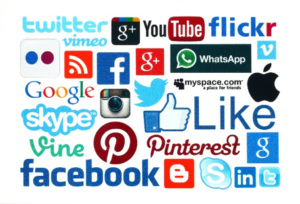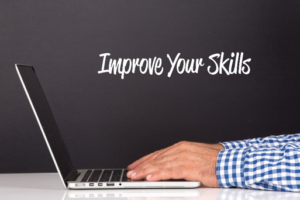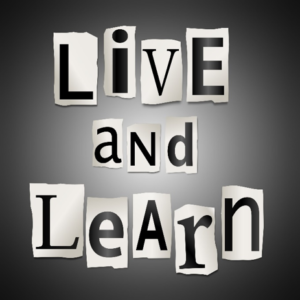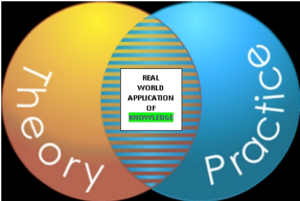Learning how to… Ski
So, you decide that it would be really cool to learn to ski. Back before the Information Age,if you wanted to learn how to ski, you’d start first by going to a ski resort and find an instructor. The instructor-skier would help you select and understand the equipment. Your instructor would be your learning guide while you absorbed the mechanics of skiing. You’d work to apply what you learned by practicing on your own time. The bulk of your learning was done on the slopes after the lessons were done. Eventually, you wouldn’t need that daily instruction, and you’d consider yourself a competent skier. Pretty soon you would be on the advanced slopes having the time of your life.

Today, when some people want to learn to ski, they spend hours scouring the internet for every blog post and article about skiing across the world. They watch endless videos of people skiing, research the best equipment, and probably join a Facebook group for winter sports enthusiasts. Soon they feel like an expert in all things ski-related after they internalize the newfound resources. But here comes the rub; have they actually learned to ski?
No.
There’s a big difference between reading skiing about strapping on skis and actually heading down the slopes…even the bunny slopes.
You can, at any moment of the day or night, do a google search, or scroll through Facebook and see posts about simple stretches to relieve pain, how to make a soufflé, and how to be single, or married and be happy. Or if you go on YouTube, you can find authorities talk about cooking tips, makeup tips, therapeutic tips, or even Youtubers teaching guitar, piano, banjo, trumpet…and on it goes.

But those activities, those exercises, the way to make a soufflé’, how to be happy being alive, how to do all of those things musical, are activities that most people never ultimately master. Technology has delivered to us such a magnificent surplus of information, but it hasn’t made any of us a bit smarter.
Not a one.
Spoiler Alert: The simple exposure to information doesn’t make you a better thinker and/or learner.
It probably doesn’t come as much of a surprise that most people have never learned how to learn properly. According to a New York Times Article, people spend 50 minutes per day just on Facebook. Yet it appears that few realize that just being exposed to information is not the same as internalizing and adapting the knowledge. Even during formal education, students study and gain knowledge to write papers and take exams. But which of us has turned what we learned into true wisdom that they can apply throughout their lives, guiding us to a common or desired good end? It is uncommon to say the least.
According to an article in Scientific American, our conventional ways of adding knowledge still fail to make use of our brain’s potential. Most of us (over the age of 30, anyway) recognize that unless we use what we have learned, we are destined to forget it. I personally don’t use college algebra.
Then and now—learning it
Learning to apply knowledge is different today than in the past, because it’s so easy to be exposed to so much information each and every day. Classical ways of learning usually involved an apprenticeship or direct active application of the skills taught and learned.

If you wanted to become a butcher, at one time you’d likely start by finding an apprentice-level job. The journeyman butcher would show you the tools and how to use them, the anatomy of the animals you worked with, and served as a guide while you learned the simplest of techniques involved in butchery. You’d constantly work to apply what you learned by practicing at work and at home, as well as doing every small and seemingly unimportant task at the butcher shop. Eventually, you wouldn’t need your teacher; you’d be a competent and confident butcher prepared to do your work, serve your clients, and keep your shop clean and healthy.
As with the ski slopes and skiing, there’s a big difference between reading about holding a knife and actually learning the mechanics of using it. Mastery takes practice and time.
You want quality, not quantity
We have allowed an imbalance to occur. It is the imbalance between the information we absorb and what we actually use. Your brain working to send data from your working memory to your long-term memory, but it simply can’t retain everything.

We are also distracted by the simple chase, because the simple pursuit of information is beyond thrilling for most people. When you add to that the desire to keep up, you find most people scanning Facebook hourly. Many people today, young and old alike, are overwhelmed by the “fear of missing out” (FOMO) to the detriment of genuine learning. Most young people are up-to-date on the wild tabloid stories, and sharing their lives like crazy on sites like Facebook or WhatsApp. Yet even with all that, easy access to information is no substitute for the deep kind of learning found only through extended effort and concentration. You will find that very little of the easily accessed information applied to the lives of the people who found it.
Realistically learn and employ knowledge
It would be fabulous to learn and apply 100% of the knowledge before us; who wouldn’t? But it’s not quite possible. Yes, there are a few hyper-productive people who can achieve this level of success. But most of us aren’t that way, and as we age, we become more and more pressed for time. You discover that you have to be more no-nonsense about how you approach the information before you if you want it to stick.
Retaining information for the long-haul requires you to be very selective in what you decide to learn. Without some kind of plan, the internet is like a buffet, and thinking you and can eat it all in one meal. Breaking the plethora of information and resources into digestible chunks lets you digest the information in ways that are meaningful to you. Here are some ways that might work for you.
Filter out information that won’t improve you or your life
Scrolling endlessly across the internet is a lifeless form of knowledge acquisition. It is completely passive. Face it; the sheer volume of accessible information is always going to be greater than what you can absorb. You have to learn to filter the information you take in, focusing on what you require making the desired improvements. What do you need to learn to be successful, to grow as a person? Taking this easy first step allows you to skip unimportant and/or indirectly related material.

As you continue to grow your knowledge and skills, you can update the parameters of your filter
If you go back to the skiing example, you set up your filter by deciding what you want to learn about skiing right now. What are you trying to learn today? Are you trying to figure out how to put on the skis properly? Need to learn how to stop when you’re heading down the slope? If you are still learning about the fundamentals, about advanced techniques will be of little value. Once you are proficient with the basics, you can adjust your filters and continue growing your skill set.
The real world: try what you’ve read and confirm your learning
It isn’t of much value if you can’t ever apply it. If you really want to learn this new skill, you have to get out there and do it…practice…the things that you learned about in your research. If you have never held a knife in your hand, you are a long way from being a master butcher. You simply have not internalized it; you know about it, but it isn’t part of you. When you make the cut without thinking or pausing to recall the information, it is yours.
Not being from the Information Age, I am the first to tell you that isn’t easy to take information from the computer screen and translate it to the real world. If you are like most of us, you are bound to mess up the first time you attempt something, maybe even the second and third.

When you were learning to ski, you fell… a lot. You fell when you tried to make a smooth turn, and even when you did make it to the bottom of the slope, you undeniably compared yourself to all the other skiers you saw that day. You didn’t give up though. Giving up when you fell or letting your brain spin into a self-defeating chronicle will keep you from learning and you know it. Making mistakes is a powerful part of the learning process. Just look at the cuts on the hands of an experienced butcher.
Practice, get advice, then practice, and get advice
Working diligently to employ what you’ve learned is terrific, but keep in mind that there is only so much that can be done by yourself. The input of others—skilled people—is critical to take your learning to the next level.
Yes, you can start a feedback cycle by performing a self-assessment, taking stock of where you are in the learning process. Yet if rapid and steady growth is your goal, you simply must get feedback from experienced operators.

It’s so easy to stop at the self-assessment stage and convince yourself that you are doing everything well. It still feels good, but you never know what you don’t know. Gaining understanding from skilled operators helps you figure out where to focus your continuing efforts next so that you are always learning and improving.
When you start to develop new skills, you just might be able to do the thing right the first time, but if you don’t to practice, you’ll never internalize the knowledge. As I mentioned in an earlier paragraph, you simply must repeat your work and the process until it becomes second-nature, natural as dressing in the morning.
Here is one way to see it; when you learn a new word, you generally go through the process of looking it up, repeating the definition, and using it in a sentence a couple of times until it feels natural. But past the first moments, if you fail to use the word regularly, you will indeed forget it. It will become one of those works you “know” but never use.
Learn next what comes next and don’t waste your time on unnecessary stuff
By focusing your searches on critical information, as opposed to mindless scrolling, you’ll retain more of what you learn.
Take every chance you can to consider what you have learned along the way in gaining your knowledge. Not only will you feel better about your developmental progress, but you will be able to make use of what you already knew when you take on a new challenge.
If I can bore you with my skiing example one more time, imagine that you’ve now successfully mastered the basics of skiing. You can now safely turn smoothly and stop when you decide you want to. What comes next? How will all those things that you just learned about skiing affect your process moving forward? What do you want to learn next?
Knowledge not applied is knowledge wasted
To really know something, you’ll have work with it on a routine basis. In the process, you will need to allow yourself sufficient opportunities for self-reflection and objective feedback from people who know. Knowledge is, like most things, cumulative. The greatest thinkers and most successful athletes didn’t become that way by paging through social media or by just reading books. They put in the time and they made meaning of what they learned by taking it to the real world and doing it.

True learning is rarely easy. Struggles and difficulties as you tackle new challenges, wading waist deep through the piles of information available to us all in this digital age are a shared experience. It was a shared experience before the digital age, and will likely always be that way.
Only by focusing your efforts mindfully and making thoughtful choices about what and how you learn, will you successfully navigate the wealth of resources available to all of us. If you are successful in this effort, you can indeed make meaningful gains in your life and what you know.

How do you learn things? Is is it a process of learning and experimentation… or just reading about it. Let me know how it works for you and if you would like to talk, schedule a time for a call and let’s give it a go.
CLICK HERE TO SCHEDULE YOUR CALL
Did You Enjoy This? Become a Subscriber and Learn More
As an independent coach and writer, I manage my own marketing, my own press, and all of my own content and develop it with content responsive to your requests.
By becoming a member of my site, you can gain access to articles, audio versions, and commentaries relevant to my articles, interactive online courses, and with quite a bit more to come, I hope to hold your interest for quite a long time as you grow and learn.
Sources:
| New York Times: Facebook Has 50 Minutes of Your Time Each Day. It Wants More.
|
|
| Scientific American: What is the Memory Capacity of the Human Brain?
|
|
| The Atlantic: Why Germany Is So Much Better at Training Its Workers
|
|
| Huffpost: The Internet May Be Changing Your Brain in Ways You Never Imagined
|
|
| National Bernstein Network Computational Neuroscience: How is Information Transferred Into Long-Term Memory
|
|
| HuffPost: Social Media, FOMO, and the Perfect Storm for the Quarter-Life Crisis
|
|
| Teach Thought: 10 Ways to Honor Mistakes in the Learning Process
|
|
| Fast Company: Why You Hate Getting Feedback but Still Need More of It |


